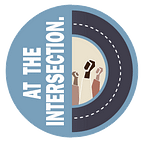Mobility Over Modality
An introduction to a new series co-written by the editors of At the Intersections
Dominant planning discourse is a narrative of absolutes where conversations on mobility policies that have a direct negative impact on the safety and livelihood of people of color are largely avoided. And the pursuit of ornamental actions to make our cities more charming and dynamic for white middle-class residents are prioritized with the full force of our industry.
Transportation planning is intentionally skipping dinner to focus on dessert and claiming we’re full. Meanwhile, our communities are left malnourished.
We are promoting one-dimensional projects and policies within silos while failing to interrogate our role in building transportation systems that rely on enforcement and result in disproportionate traffic violence deaths for people of color. Pedestalized solutions like Vision Zeroᵀᴹ, the total banishment of cars, or state-controlled open streets are often advanced with total disregard for nuances and implications, leaving us ill-equipped to address our institutionally-created societal ills.
As a result, we police what we refuse to fund. And we “plan” what we refuse to imagine.
We enforce laws against “loitering” but actively shift funding away from parks. We give tickets for jaywalking and refuse to fund crosswalks. We harass and ticket youth on transit when we can afford to make it free. We police unhoused residents because we have actively displaced communities and made cities unaffordable. Urbanists can wrap their minds around a world without cars, but their imagination fails them when it comes to the freedom of movement for Black and brown communities.
Using cars as a scapegoat allows us to reject the need for deeper analysis on whose social norms are being used as a baseline. Living in the disconnect between what is and what should be lies a lack of reckoning with the legacies of redlining, policing, and discrimination. These legacies continue to birth inequities and restrict mobility for Black and brown people today. Perhaps this is because, in the words of Dr. Allyson Hobbs, Black and brown mobility has always been an enduring source of white anxiety.
It is through this lens that we launch Mobility Over Modality, our first co-authored series published in At the Intersections. Here, we say any framework that doesn’t center the embodied experiences of Black and brown people in all of our bodies is insufficient, inadequate, and irrelevant. We call for an end to mode-based frameworks and hierarchies. In its place, we call for plans and frameworks that focus on mobility as a moral and ethical question as much as it is a technical imperative that must prioritize personal safety and freedom of movement for Black and brown people and communities.
